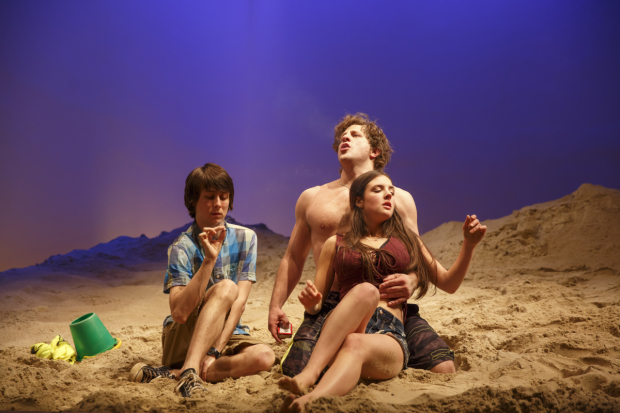Indian Summer

(© Joan Marcus)
Summer lovin', happened so fast. So fast, in fact, that it never really seems to have happened at all in Gregory S. Moss' Indian Summer. What begins as a fairly cliché story about a love-hate attraction blossoming in the dunes of the Rhode Island seashore darkens into a complex (and somewhat sleepy) meditation on lost opportunities brought about by fear-based decisions. The clock ticks and life seems to drift away with the tide in this charming but flawed world premiere at Playwrights Horizons.
The story follows Daniel (Owen Campbell), a moody and awkward 16-year-old visiting his grandpa George (Jonathan Hadary) in Rhode Island while his mother is away "finishing some things up." He meets local tough girl Izzy Rizzo (Elise Kibler) on the beach when she catches him playing with her little brother's favorite plastic pail. Their initial belligerence turns into a mutual fascination, but is it love? Seventeen-year-old Izzy already has a 27-year-old muscle brah of a boyfriend, Jeremy (Joe Tippett). Jeremy wants to marry Izzy, but she dreams of leaving Rhode Island — an unlikely prospect if she settles down right after prom.
Moss crafts some very funny banter between Daniel and Izzy. "All I ever do is give things up, give things up to people like you," he raves at her, clutching the busted green bucket.

(© Joan Marcus)
"Why am I not punching you right now?" Izzy rhetorically asks in response to his impudence. Despite a strong first impression, she's so much more than a guidette stereotype. Kibler smartly unpacks her character's journey, slowly revealing a sensitive and intellectually curious young woman on the precipice of disappointing adulthood. Even if the play seems to begin as Daniel's story, it's all about Izzy by the end.
This may be because the stakes for Daniel feel incredibly low, pushing us toward greener dramatic pastures. No matter what happens this summer, he's getting out of Rhode Island. Life-altering choices for Jeremy, Izzy, and George can only ever register as poignant lessons and half-remembered anecdotes for him. Campbell's aloof performance betrays this: Even his hormonal rages seem halfhearted and slightly in jest.
Hadary's George, on the other hand, seems to be covering up a deep sadness with quirky old-man eccentricity. Still mourning his dead wife, he speaks directly to the audience, offering pseudo-philosophical bits of wisdom about the tides and seasons. Hadary proves to be an enthralling monologist, even when tasked with delivering such heavy-handed allegories.
While much of the play gently washes over us, Tippett thrillingly stirs up real waves as Jeremy: He wholly embodies the late-twenty-something townie who surrounds himself with teens for lack of more age-appropriate peers. His macho posturing — at one point, he growls "This is Rhode Island" like a Spartan warrior — is just a defense for a host of insecurities about his virility.

(© Joan Marcus)
Throughout the play there is a palpable and uncomfortable divide between the natives and the "summer people," most clearly visualized by Kaye Voyce's clever costumes: Daniel appears to be dressed for a campout (in the library), while the perpetually sleeveless Jeremy performs the gun show in his colorful active wear. Always prepared, Izzy wears her swimsuit under cutoff tops and homemade Daisy Dukes (the inside pockets protruding from the bottom show that they were fashioned out of longer jeans, letting us know that Izzy is creative and resourceful). We can tell who feels at home by the sea and who does not.
Scenic designer Dane Laffrey brings the beach to 42nd Street by covering the stage in sand, a messy yet perfect choice. Director Carolyn Cantor artfully stages the scenes to bleed into one another in a way that maintains the flow of the play without sacrificing clarity. With no major set changes or time shifts, however, the 15-minute intermission feels superfluous in this 2 hour, 10 minute affair, which drags in the second half.
Moss has some important insights about the nature of relationships, the injustice of circumstance, and the cruelty of time, but those observations would be a lot more impactful in a better-edited play. Presently, watching Indian Summer feels a lot like hunting for a lost wedding ring in a watery cloud of sand and seaweed: We know something truly valuable is there, but it is hard to discern through all the muck.










